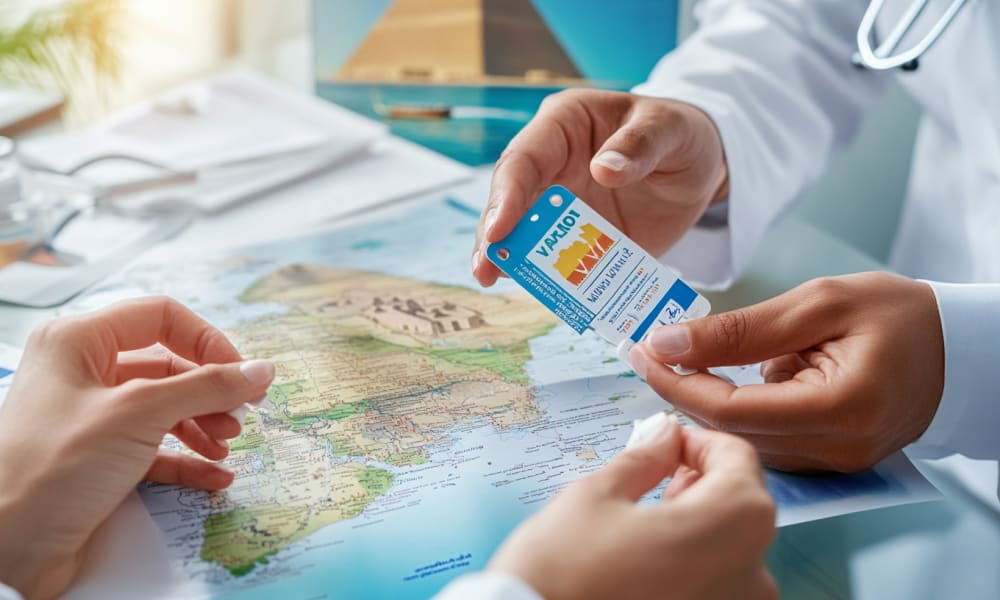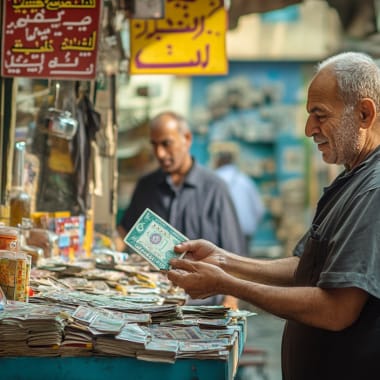
Vaccinations and health precautions for Egypt
Everything about vaccinations, hygiene, and health protection for your trip to Egypt – from the Nile to remote regions.
Everything about vaccinations, hygiene, and health protection for your trip to Egypt – from the Nile to remote regions.
Those planning a trip to Egypt look forward to impressive temples, the turquoise Red Sea, and the fascinating heritage of the pharaohs. However, to avoid health problems during the trip, careful preparation is worthwhile. In some areas of the country, infectious diseases or hygiene-related complaints can occur, which can be avoided through simple measures.
In this article, you will learn which vaccinations are mandatory or recommended for Egypt, what health precautions are particularly applicable for Nile cruises or remote regions, and how you can effectively protect yourself from typical travel illnesses. The goal is to provide you with a well-informed orientation – for a safe, healthy, and thoroughly successful trip to Egypt.
Mandatory vaccinations and recommended vaccinations
Before traveling to Egypt, you should not only think about sunscreen and your passport but also check your vaccination status. Although there are no general vaccination requirements for entry from Germany, Austria, or Switzerland, international health organizations recommend a range of vaccinations that you should refresh or complete in time before departure.
Mandatory vaccinations
Currently, there are no mandatory vaccinations for direct entry to Egypt from Europe. Exceptions apply only to travelers who have spent time in yellow fever endemic areas (e.g., certain countries in Africa or South America) in the past few days – in these cases, a valid yellow fever vaccination is required. An appropriate vaccination proof is also required for entry from polio endemic areas such as Kenya, Niger, or the Democratic Republic of the Congo. However, this does not apply to the vast majority of individual travelers.
Recommended vaccinations
It is recommended that all travelers have current vaccination protection as part of the standard vaccinations. This particularly includes tetanus, diphtheria, pertussis (whooping cough), polio, as well as measles, mumps, and rubella (MMR).
Additionally, professional organizations such as WHO, RKI, and the German Society for Tropical Medicine recommend the following vaccinations, depending on the type of travel, duration of stay, and individual risk factors:
- Hepatitis A: Recommended for all travelers – protection against infections through contaminated food or water.
- Hepatitis B: Useful for longer stays or increased exposure, such as close contact with the local population or medical treatments.
- Typhoid: Especially for travel under basic conditions or to rural areas.
- Rabies: If in close contact with animals or for longer stays outside tourist centers.
- Meningococci (ACWY): For long-term stays, crowds, or during the dry season.
- Dengue fever: For specific forms of stay, e.g., longer trips to rural risk areas – complete vaccination coverage is currently not widely available.
- Influenza and pneumococci: For individuals over 60 years or with chronic pre-existing conditions.
Which vaccinations are advisable in individual cases should ideally be discussed early – preferably 6 to 8 weeks before departure – with a travel medicine consulting center or your family doctor.
Specific vaccination recommendations for Nile cruises and remote areas
Depending on how and where you travel in Egypt, health requirements also differ. Those cruising on the Nile or exploring remote areas of the country should take additional precautions beyond standard vaccinations. This is because both contact with standing water and limited medical care increase health risks in certain situations.
Vaccinations for Nile cruises
Nile cruises are one of the most popular forms of travel in Egypt – at the same time, they carry special risks. Close contact with freshwater increases the risk of infection with schistosomiasis (bilharzia), a tropical disease transmitted by parasites in slow-moving water. Since there is no vaccination against schistosomiasis, swimming in the Nile or its tributaries should be strictly avoided.
Vaccinations against hepatitis A and typhoid are particularly recommended for cruise guests, as both diseases can be transmitted through contaminated water and food. A hepatitis B vaccination is also advisable – especially for longer stays or in the event of medical emergencies on board. Additionally, good mosquito protection is essential to protect against rarely occurring diseases such as dengue fever or West Nile fever.
Vaccinations for remote areas
For travel off the typical tourist paths – such as in rural villages, areas near oases, or the Western Desert – stricter recommendations apply. In addition to standard vaccinations, travel medicine experts also recommend rabies vaccination in these cases, especially if planned animal contact or trekking tours with overnight stays in nature are involved. A vaccination against typhoid is also highly recommended in areas with poor infrastructure.
Travelers with close contact to the local population or those staying longer in medically underserved areas should also consider hepatitis B and meningococcal vaccination (ACWY). In remote areas, mosquito protection, drinking water hygiene, and a well-stocked travel pharmacy are essential pillars of healthy travel planning.
Health risks and preventive measures
A trip to Egypt promises unforgettable impressions, but it also brings health challenges. To avoid typical travel illnesses, you should thoroughly inform yourself and take targeted precautions in advance. Besides classic infectious diseases such as hepatitis A or diarrhea, mosquito bites, heat, and hygiene-related risks should not be underestimated. Those who prepare can effectively face these dangers – and enjoy the trip relaxed.
Yellow fever and entry requirements
For travelers from Europe, there is no requirement for yellow fever vaccination when entering Egypt. However, this rule only applies if you have not previously been in a yellow fever endemic area. If you have entered from an affected country within the last six days before your arrival, corresponding vaccination proof is required. In such cases, vaccination at least ten days prior to entry is strongly recommended to avoid being denied entry.
Meningococcal risk and preventive measures
The risk of a meningococcal infection in Egypt is low but can rise with close contact with many people – for example, in accommodations with communal living arrangements or during long stays. Particularly during the dry season from December to May, the risk of transmission increases. Therefore, vaccination against meningococci of serogroups ACWY is recommended for longer stays, for students, backpackers, or those in close contact with locals.
Polio situation in Egypt
Egypt is currently considered polio-free; nevertheless, complete basic immunization against poliomyelitis is essential. For travelers staying in the country for more than four weeks, international proof of a polio booster vaccination within the last twelve months is mandatory upon departure. It is advisable to check your vaccination status before travel and refresh it in time, also for your own protection.
Protection against insect-borne diseases
Even if Egypt is not a classic tropical country in many parts, certain regions still have diseases that are transmitted by mosquitoes or sandflies. These include particularly dengue fever, leishmaniasis, and West Nile fever. Although these diseases occur rarely, consistent insect protection is advisable – especially for travel to rural areas, along the Nile, or to the south of the country.
Currently, malaria prophylaxis is not required for Egypt. Instead, the focus is on protection against bites: with clothing, mosquito nets, and high-quality insect repellents, travelers can significantly reduce the risk and enjoy their trip without worry.
Malaria prophylaxis
Egypt is currently considered malaria-free. This means that no medication-based malaria prophylaxis is necessary – neither for classic cultural trips nor for stays in oasis regions or in the countryside. However, those who want to be particularly safe can seek individual travel medicine advice, especially if the travel route is very remote or unusual.
More important than medication in Egypt is preventive mosquito protection, which not only protects against malaria but also against other diseases such as dengue or the West Nile virus.
Measures for mosquito protection
The most effective protection against mosquito bites starts with the right clothing: wear long-sleeved, light-colored clothing and long pants to show as little skin as possible. Impregnated clothing or textile sprays with permethrin offer additional protection.
For exposed skin, repellents with DEET (30–50%) or Icaridin are recommended – applied regularly, especially in the evenings and at night when many mosquitoes are active. In air-conditioned accommodations with intact mosquito nets or screens, mosquito exposure can also be significantly reduced.
Simple behavioral rules also help: Avoid outdoor stays during dusk, refrain from strongly perfumed cosmetic products, and pay attention to standing water in cities. Those traveling with children should equip strollers and beds with mosquito nets.
Health precautions regarding hygiene
One of the most common causes of health complaints on trips to Egypt are gastrointestinal diseases – often triggered by contaminated water or food. With simple but consistently implemented hygiene measures, the risk can be significantly reduced. Whether eating in a restaurant, on the go at a bazaar, or brushing your teeth in a hotel – by observing a few basic rules, you reliably protect yourself against travel diarrhea, hepatitis A, and other infections.
Water hygiene
In Egypt, tap water should generally be avoided – not only for drinking but also for brushing teeth or washing dishes. Instead, use bottled or boiled water and be aware that ice cubes in drinks often come from tap water. To be on the safe side, do not use open water sources when showering and avoid splash water when washing food.
Clean water is also crucial for handwashing. If there is no access to water and soap – for example, on excursions or during longer bus rides – disinfectants or wet wipes can help maintain hand hygiene.
Food hygiene
Fresh fruits and vegetables should either be thoroughly washed or peeled – if unsure, it is better to avoid them if it is not clear whether clean water was used. Avoid raw or undercooked foods, especially fish, meat, and eggs. Buffets can also present a risk if foods are not continuously cooled or heated.
Ensure that food is well cooked and ideally freshly prepared – whether in the hotel restaurant or at a small snack bar. Flies should be kept away from food, as they can transmit pathogens. By following these simple rules, you lay the foundation for a relaxed and healthy trip.
Discover the Orient with experts who have explored every corner themselves
Your dream holiday, tailor-made by experts.
We don't just know the Middle East from books, we visit the country several times a year to experience the culture, landscape and people first-hand.
From your first enquiry to your return home, we are there for you personally - by phone, email or WhatsApp, whenever you need us. Our trips are as unique as you are: individually planned and provided with exclusive privileges and high-quality arrangements that will make your trip unforgettable.
Experts for your Orient trip







